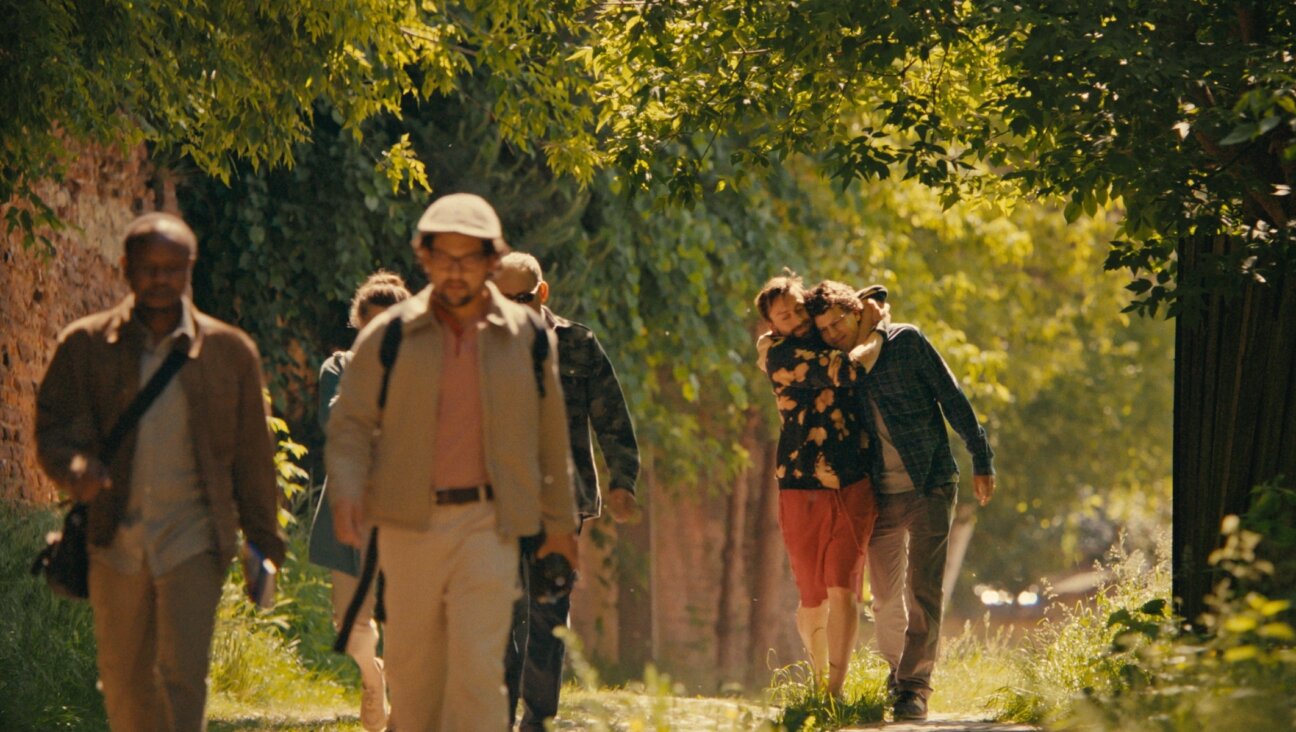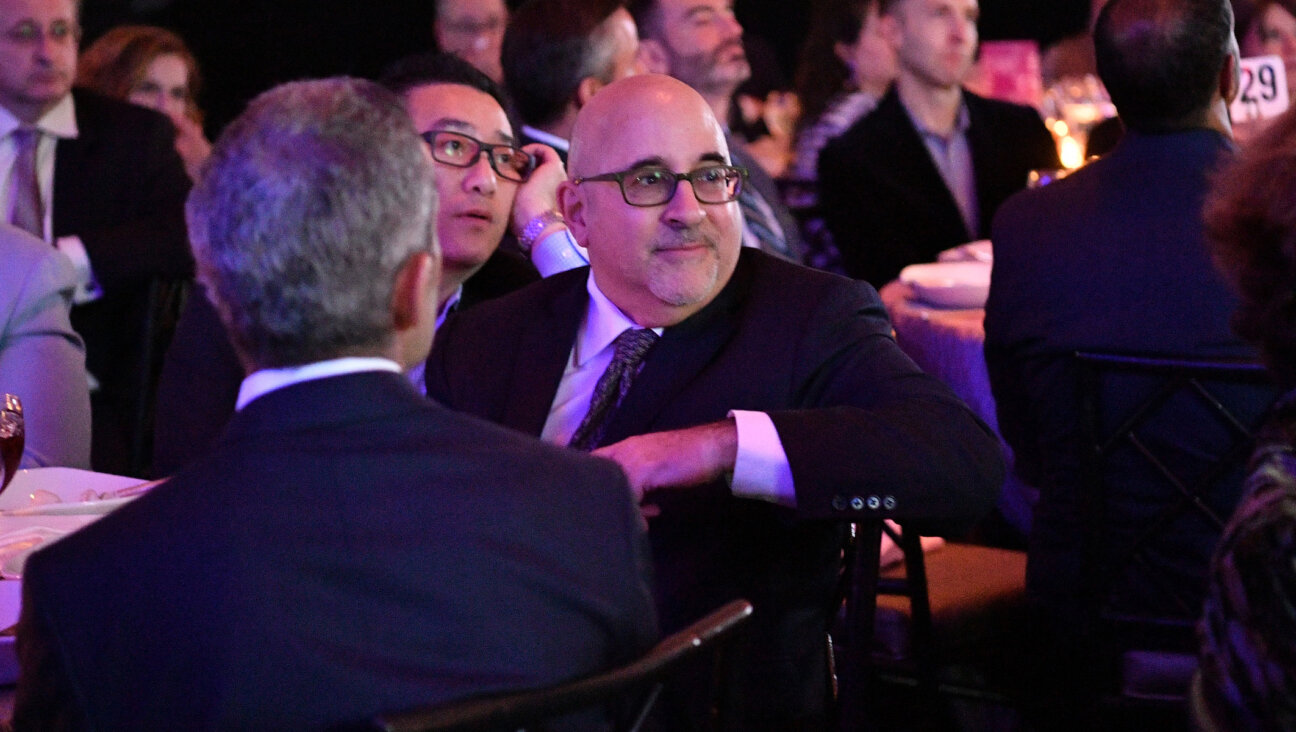6 Questions For Jonathan Lethem

Writer Jonathan Lethem reads his work at The 2009 New Yorker Festival. Image by Getty Images/Amy Sussman/Stringer
In more than one way Jonathan Lethem’s latest novel “The Feral Detective” is a return to basics. The book reengages with his bold first-person voice and his Raymond Chandler roots, but also tells a story about aching for reinvention in a simpler world. Its main character, Phoebe Siegler, quits her job at The New York Times, disgusted by the paper’s November 2016 interview with President-Elect Trump. In need of a new purpose and a fresh start, Phoebe travels to Upland, California to search for her friend’s lost daughter, Arabella, with the help of the mysterious locater of missing kids Charles Heist, otherwise known as “The Feral Detective.” Along the way she encounters off-the-grid desert tribes, the Rabbits and the Bears, and wonders if their more primal reality presents a viable alternative to a Trumpian world. The Forward spoke with Lethem about how current events shaped the book, how it felt to make the leap to female first person and the late Leonard Cohen’s sandwich habits.

Jonathan Lethem Image by Courtesy of Amy Maloof
PJ Grisar: You had been working on this book for some years before Trump’s election but the events of 2016 are impossible to divorce from this book, down to something as basic as character motivation. I wonder what survived from the initial drafts or the early conception of the book?
Jonathan Lethem: If I really trace the roots, I’ve been thinking about feral things for a while. The condition of running a bit wild is something I identify with. Equally obviously, the detective mode that this book engages with is something that’s at the root of my origin story as a writer, my falling in love with Raymond Chandler and that first-person voice and what it can do. This material was coalescing and I was beginning to have a handle on it in the summer and early spring of 2016. I thought, “this would make a nice little project to write during the Hillary Clinton administration.” Like many people, I woke up that day in November and what was on my plate looked kind of pointless. I think the book in some ways is an attempt to grapple with what I felt at that moment. It suddenly became a coping mechanism. I began to look at the material and figure out how to reconnect with it. I was given a little bit of a gift in that a character I already conceived, Phoebe, was a really good proxy. She was someone who was angrier than I was in a way for basic reasons of gender. She became my way out. It wasn’t like I thought, “oh I’m going to have deep thoughts and solve this problem.” It was more like I could tell this story and if she was pissed off then I wouldn’t have to focus on it in the same way. I think in a way the subject of the book, to the extent that it is topical, it’s a book about trying not to be in this present world as much as it is a book that confronts this present world. The Rabbits and the Bears are people that ran out of the reality system into their own space. With this space there’s a fantasy, which is very American and that I am very tempted by, but also very suspicious of: “What if you could go elsewhere?” What if there’s still a place where it doesn’t matter who you voted for or you don’t even know there was an election and where deeper human conditions are at stake?
Still, an interesting thing about the Rabbits and the Bears is how they mirror our factionalism. They seem to reflect not just how political parties divides us, but how gender does too. The Rabbits are more maternal and the Bears are kind of aggro and hyper masculine. Did the #MeToo era also inform the way those two camps are presented in the book?
In some ways that became the almost unbearably obvious metaphor, but of course I had invented this system before and something that I feel more and more is that what 2016 represents is an uncovering or disclosure of the crisis we were already in the teeth of, and the system of male-female, Rabbit-Bear, it’s much deeper than Red-Blue or, whatever, the MAGA versus the “woke.”
It’s also a book about men and the problem of men, which is an extreme example of something I can name without having the solution to. There’s another point where Phoebe’s readying herself to finally meet the Bears. She’s sort of built them up in her mind. She’s thinking they’re going to be these kind of Robert Bly drum circle guys and instead they’re more like, just a poisonous biker gang. They’re way past their sell date in their Aquarian, counterculture vision of what men can be. In that way Heist is a figure like a Bartleby the Scrivener. He was elected to be King of the Bears and he would prefer not to. And what can he do instead? Well, he’s very inert really. He’s kind of just hiding and every now and then he comes out of his hiding and pulls someone else out of the maelstrom. He doesn’t really know what to do with the problem of being a man.
This book is a return to the detective genre for you but it flips the script by having a female perspective. The genre is known for its use of the male gaze, and in this Phoebe is the one who’s kinda leering at the book’s male lead. Of course this feels political at the moment. You mentioned earlier that Phoebe was a character in the book pre-election, but was she originally a first-person character? Was it Heist originally?
Until I had not only Phoebe, a New Yorker who blunders into this reality, but also understood that I was going to do the book in her first person I didn’t have a book. I was interested, but I wasn’t there. And it’s Phoebe’s book. I think the illusion that someone can narrate a book and not be in it — that really dies with Modernism – ”The Great Gatsby.” It’s about what she can tell us.
Heist is a conundrum. I don’t think she solves him and I don’t think the book solves him, but it doesn’t matter because to me anyway if the book works — and I hope it does — it’s because Phoebe’s real. My sense of the crisis for masculinity in some ways is reflected in my sense that I couldn’t bear to write another hard-boiled first person male. I had to get outside myself.
Leonard Cohen’s Mount Baldy zen retreat features pretty big in the book. Of course he died right around the election as well. I was wondering if it was his music or the strange location, near where you live, that called out to you? It’s interesting that the missing person, Arabella, a young college student was such a diehard fan of his.
I have been absorbed in Leonard Cohen’s music mostly, but then also his writings and the myth of him for decades now. He was introduced to me by the dad of a best friend in high school. He had a Leonard Cohen record and played it for me. I laughed so hard. I didn’t believe you could write lyrics like that. I thought “that person’s crazy.” What was the song? “You were Marlon Brando, I was Steve McQueen. You were KY Jelly, I was Vaseline.” Then I moved to this marvelous little pocket university [Pomona College, where Lethem is the Roy Disney professor of Creative Writing] in Southern California, Claremont. One of the great on-the-ground legends here is you can see Mount Baldy, I can see it from my office right now. It’s a 20 minute drive to Baldy Village from the town I live in and yet it’s a totally other universe and that’s where, among other crazy things that happened on Mount Baldy, Leonard Cohen’s zendo [his meditation hall] was with all its fascination, it was very available. People could drive up there and blunder in and he’d be sitting there. And when he was pining for a tiny scrap of civilization, which I think, in his case, took the form of his wanting a pastrami sandwich, he would come down the mountain and appear at this local market. They have this sandwich joint called Wolfe’s. He’d come down in his robes. Now this was before my time, but the sweetness and oddness of this anecdote was immediately vivid to me. When I moved here he was still alive and I think he had moved west to Hollywood at that point. But then he died at the moment of the election and I had already conceived that Mount Baldy was a fixture in this story, that it was one of the pivotal places, because I wanted to write about the weirdness of where I live. It felt like it coalesced and it also gave me a way to think about Arabella who was — you know, one of the hardest things is to write the character who’s not there. Who matters to everyone in the story but is an absence. And I teach 18 and 19 year-olds, so they’re real to me, but they can be quite opaque to me as well. I had to make up this missing college freshman and the fact that she would have both a Pussy Riot and a Leonard Cohen poster in her high school bedroom gave me something. Until I met her it was a cheat. Suddenly I had this joke where “if she was to run away, what would she run away to do?” Well, she would follow what in fact was a cold trail and think “I’m gonna sit and meditate with Leonard at his Mount Baldy retreat.”
The title “The Feral Detective” feels like a nod to Bolaño. Who were you drawing on when you were writing this?
I have to plead real innocence! I didn’t make the obvious connection until my German publisher, they sent me their mockup of a cover and they had translated it as “Der Wilde Detektiv.” I was like “Oh.” The title for Bolaño’s book, “The Savage Detectives” is “Wilde Detektivs.” So it was like I singularized his plural title. It was completely unconscious. I did write a novel under the spell of Bolaño, “Chronic City.” I don’t know if that was obvious to people, but his radical freedom really busted open my way of thinking about that book in a great way. You always have your intentional and unintentional influences at any given point and I was very conscious of going back to Chandler and Ross Macdonald here, but I was also thinking about a lot of women writers I love and getting Phoebe to be real to me meant thinking a lot about Dawn Powell, who I ended up using as an epigraph, and all sorts of writers to get to where I needed to be for this book. But I had not thought of Bolaño until it was pointed out afterwards.
“Motherless Brooklyn” is coming to theaters next year under the auteurship of Edward Norton. I know it may not match the excitement of your “BoJack Horseman” ringtone cameo, but how are you feeling about having the film out there?
That “BoJack Horseman” thing is the one thing my students care about in my entire career. It’s the only thing I do that impresses them!
But yeah, it’s very cool. I’m still in disbelief because I’ve had so many years of being the developed but un-filmed guy. And I just took that to be a fundamental condition. It was true for “Motherless Brooklyn” for 20 years, but it was also true of a lot of the other novels that they’ve been in very rich, interesting development histories with great talent, fascinating people and stars. I’ve just taken it as “Yeah, that’s never gonna happen.” And I’ve been right. But it’s very interesting to contemplate making that passage and I’m also really in a position of an audience member here. I not only wasn’t the screenwriter and I wasn’t close to the production, I haven’t even seen the script. I’m really just gonna walk in and see a movie like you will. Now there’s gonna be a movie I guess and even more people will read that book. I’m a very lucky person.
PJ Grisar is the Forward’s culture intern. He can be reached at [email protected].
A message from our Publisher & CEO Rachel Fishman Feddersen

I hope you appreciated this article. Before you go, I’d like to ask you to please support the Forward’s award-winning, nonprofit journalism so that we can be prepared for whatever news 2025 brings.
At a time when other newsrooms are closing or cutting back, the Forward has removed its paywall and invested additional resources to report on the ground from Israel and around the U.S. on the impact of the war, rising antisemitism and polarized discourse.
Readers like you make it all possible. Support our work by becoming a Forward Member and connect with our journalism and your community.
— Rachel Fishman Feddersen, Publisher and CEO























